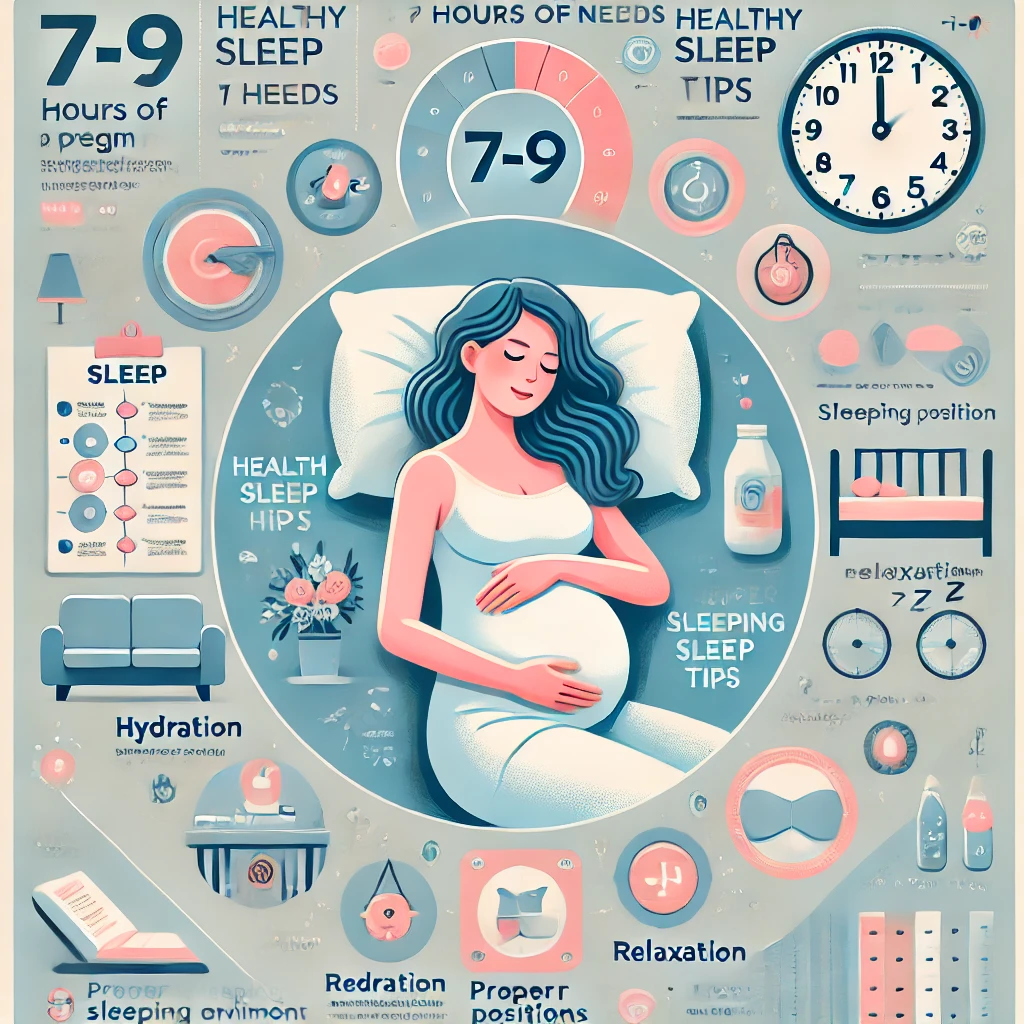Sleep is an important factor for overall health, but during pregnancy it becomes even more essential. Getting enough sleep supports the physical and mental health of both mother and developing baby. However, many pregnant women have difficulty getting enough sleep due to many physical and hormonal changes. So, how much sleep do pregnant women need? This article from Wilimedia will explore the importance of sleep during pregnancy, how much sleep is needed, and tips to improve the quality of sleep.

How Many Hours of Sleep Do Pregnant Women Need? 6 Comprehens
The Importance of Sleep During Pregnancy
During pregnancy, a woman's body undergoes many major changes to support the growth of the fetus. These changes can lead to increased fatigue and a need for more sleep. Getting enough sleep is important for several reasons:
- Support Fetal Development: Sleep plays an important role in the development of the baby. During sleep, the body works to repair cells, grow tissues, and develop the brain, which is important for the overall development of the baby.
- Boost Your Immune System: Getting enough sleep helps boost your immune system, which is especially important during pregnancy when a woman's immune system is compromised.
- Improve Mental Health: Pregnancy can be an emotionally challenging time, and sleep is essential for mental health. Getting enough sleep helps manage stress, reduce anxiety, and improve mood, which benefits both mother and baby.
- Reduce Pregnancy Complications: Lack of sleep has been linked to complications such as gestational diabetes, preeclampsia, and prolonged labor. Ensuring adequate sleep may help reduce the risk of these complications.
- Physical Recovery Support: Pregnancy requires a lot of energy, and sleep provides the body with the time it needs to recover from the day's activities, ensuring that mom stays healthy and energized.
How Many Hours of Sleep Do Pregnant Women Need?
The amount of sleep needed can vary depending on the individual and the stage of pregnancy. However, most experts agree on the following general guidelines:

How Many Hours of Sleep Do Pregnant Women Need? 6 Comprehens
- First Trimester: During the first trimester, pregnant women may feel tired due to the baby's rapid growth and increased levels of progesterone, a hormone that promotes sleep. It is recommended that pregnant women get at least 7-9 hours of sleep each night during this period. Additionally, taking short naps during the day can help reduce fatigue.
- Second Trimester: The second trimester is often referred to as the “honeymoon phase” of pregnancy because many women feel more energetic. However, it is still important to try to get 7-9 hours of sleep each night. As your body adjusts to pregnancy, maintaining a regular sleep schedule can help maintain energy levels.
- Third Trimester: The third trimester can be the most difficult period for sleep. As the baby grows, physical discomfort, frequent urination, and anxiety about the upcoming birth can disrupt sleep. During this time, pregnant women should aim for at least 8-10 hours of sleep each night, with the ability to nap during the day to make up for any interrupted sleep at night.
Factors Affecting Sleep During Pregnancy
Many factors can affect sleep during pregnancy, making it difficult for some women to get enough sleep. These factors include:

How Many Hours of Sleep Do Pregnant Women Need? 6 Comprehens
- Physical Discomfort: As your baby grows, the extra weight can cause discomfort, making it difficult to find a comfortable sleeping position. Backaches, heartburn, and leg cramps are common problems that can disrupt sleep.
- Hormonal Changes: Hormones like progesterone can make pregnant women feel more tired, but they can also cause frequent nighttime awakenings. These hormonal changes can lead to frequent urination and difficulty staying asleep.
- Anxiety and Stress: Pregnancy often brings feelings of anxiety and stress, which can lead to insomnia or restless sleep. Worries about the baby's health, the birth process, and the responsibilities of motherhood can keep the mind active at night.
- Frequent Urination: As the baby grows, it puts pressure on the bladder, leading to frequent urination at night. This can disrupt sleep and make it difficult to fall back asleep later.
- Breathing Problems: Some pregnant women may develop sleep apnea or have difficulty breathing due to the growing uterus pressing on the diaphragm. These problems can disrupt sleep and affect overall sleep quality.
Tips to Improve Sleep During Pregnancy
Given the challenges pregnant women face in getting enough sleep, here are some tips to help improve sleep quality:

How Many Hours of Sleep Do Pregnant Women Need? 6 Comprehens
- Establish a Sleep Routine: Creating a regular bedtime routine can send signals to your body that it's time to rest. This might include activities like taking a warm bath, reading a book, or practicing relaxation techniques.
- Finding a Comfortable Sleeping Position: As pregnancy progresses, finding a comfortable sleeping position can become difficult. Sleeping on your left side is recommended, as it improves blood circulation to the baby. Using pillows to support your belly, back, and between your knees can help reduce discomfort.
- Stay Hydrated, But Have a Plan: Staying hydrated is important during pregnancy, but try to drink most of your fluids during the day to reduce the need to go to the bathroom at night.
- Control Heartburn: Eating small meals throughout the day, avoiding spicy or acidic foods, and not lying down immediately after eating can help reduce heartburn, which often disrupts sleep.
- Exercise Regularly: Regular physical activity can help improve sleep quality, but avoid exercising too close to bedtime as it can make it more difficult to fall asleep.
- Practice Relaxation Techniques: Techniques such as deep breathing, meditation, and prenatal yoga can help reduce stress and prepare the body for sleep.
- Limit Caffeine: Caffeine can disrupt sleep, so it's best to limit your intake, especially in the afternoon and evening.
- Napping Properly: If your nighttime sleep is disrupted, consider taking a short nap during the day to make up for the lost sleep. However, avoid taking long naps late in the day as this can interfere with your nighttime sleep.
- Use a Humidifier: A humidifier can help relieve nasal congestion and improve breathing, which is especially helpful if you're having trouble breathing or experiencing nasal congestion during pregnancy.
- Consider Prenatal Massage: Prenatal massage can help relieve muscle tension and promote relaxation, making it easier to fall asleep.
When to Seek Help
Although sleep problems are common during pregnancy, persistent or severe sleep problems should be discussed with your healthcare provider. Problems such as sleep apnea, severe insomnia, or frequent nightmares may require professional intervention. Your healthcare provider can offer solutions or refer you to a sleep specialist if necessary.
Wilimedia Recommendations for Pregnant Women
At Wilimedia, we prioritize the health and comfort of pregnant women. Here are our top recommendations to ensure you get the sleep you need during pregnancy:
- Listen to Your Body: Pay attention to your body's signals and allow yourself to rest when you feel tired. Don't hesitate to take a nap or go to bed earlier if you need extra sleep.
- Prioritize Sleep: Sleep is as important as nutrition and exercise during pregnancy. Make sleep a priority by establishing a regular bedtime and creating a sleep-friendly environment.
- Talk to Your Doctor: If you are having trouble sleeping, don't hesitate to talk to your healthcare provider. They can offer personalized advice and address any concerns you may have.
- Use Safe Sleep Aids: If necessary, discuss safe sleep aids with your healthcare provider. Avoid over-the-counter sleep aids unless specifically recommended by your doctor.
- Stay Informed: Educate yourself about the importance of sleep during pregnancy and take proactive steps to ensure you get enough sleep.
Conclude
So, how much sleep do pregnant women need? The answer depends on the individual and the stage of pregnancy, but most experts recommend 7-9 hours of sleep per night, with additional naps as needed. Getting enough sleep is important for the health and well-being of both mother and developing baby. By following the tips and recommendations mentioned in this article, pregnant women can improve the quality of their sleep and ensure a healthier, more comfortable pregnancy.
Website: https://wilimedia.co
